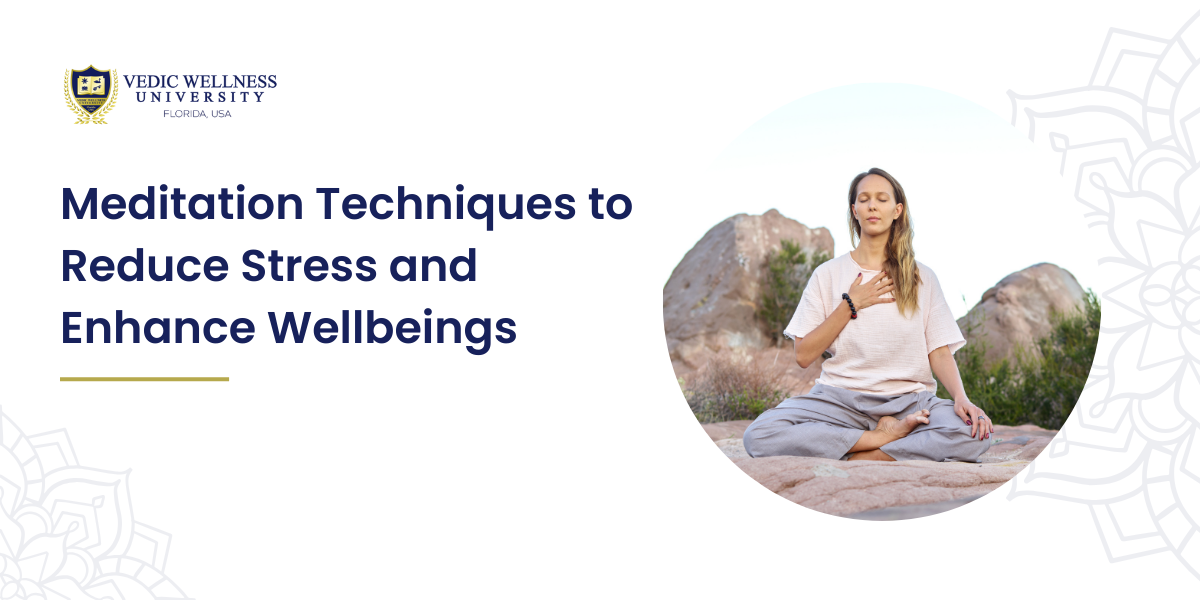In today’s fast-paced world, stress has become an almost inevitable part of life. As an international university dedicated to promoting Vedic studies, Vedic Wellness University emphasizes the significance of meditation in reducing stress and enhancing overall wellbeing. This ancient practice, rooted in Vedic traditions, is now recognized globally for its profound impact on mental health. Through our courses in yoga and meditation, Vedic Wellness University aims to integrate ancient wisdom with modern practices, offering holistic solutions for contemporary challenges.
The Science of Meditation
Meditation is a practice that involves focusing the mind and eliminating distractions to achieve a state of relaxation and mental clarity. Scientific studies have shown that regular meditation can lower cortisol levels, reduce blood pressure, and improve overall mental health. It enhances the brain’s ability to process emotions, leading to better stress management and emotional resilience.
The Importance of Yoga and Meditation
The combination of yoga and meditation, often referred to as “yoga and meditation vedic wellness,” is particularly effective in promoting physical and mental health. Yoga prepares the body through physical postures, while meditation calms the mind, creating a balanced and harmonious state.
“Yogasthah kuru karmani sangam tyaktva dhananjaya, siddhyasiddhyoh samo bhutva samatvam yoga uchyate”
(Be steadfast in yoga, O Arjuna. Perform your duty without attachment, remaining equal to success and failure. Such equanimity is called yoga.)
– Bhagavad Gita 2.48

Techniques to Reduce Stress
1. Mindfulness Meditation
Mindfulness meditation involves paying attention to the present moment without judgment. This practice helps individuals become more aware of their thoughts and feelings, allowing them to manage stress more effectively. By focusing on the breath or a particular sensation, practitioners can cultivate a sense of inner peace.
2. Transcendental Meditation
Transcendental Meditation (TM) involves silently repeating a mantra to achieve a state of relaxed awareness. This technique, rooted in Vedic traditions, helps in reducing stress and promoting mental clarity. Research indicates that TM can significantly lower anxiety and improve overall mental health.
3. Guided Meditation
Guided meditation involves following a narrator’s instructions to achieve a relaxed state. This method can be particularly beneficial for beginners, as it provides a structured approach to meditation. Guided meditation can focus on various aspects such as body relaxation, visualization, or emotional healing.
“Om Shanti Shanti Shanti”
(Peace, peace, peace)
– Traditional Vedic Chant
Enhancing Wellbeing
4. Loving-Kindness Meditation
Loving-Kindness Meditation (LKM) focuses on developing feelings of compassion and love towards oneself and others. This practice enhances emotional wellbeing by fostering positive relationships and reducing negative emotions. LKM can be particularly effective in improving mental health and promoting a sense of community.
5. Body Scan Meditation
Body Scan Meditation involves focusing attention on different parts of the body, promoting relaxation and body awareness. This technique helps in identifying and releasing physical tension, leading to improved physical and mental wellbeing.
Integrating Meditation into Daily Life
To experience the full benefits of meditation, it is essential to integrate it into daily life. Setting aside a specific time each day for meditation can help in building a consistent practice. Additionally, incorporating mindfulness into everyday activities such as eating, walking, or working can enhance overall wellbeing.
The Global Impact of Meditation
The practice of meditation has transcended cultural boundaries and is now embraced worldwide. Institutions like Vedic Wellness University play a crucial role in promoting the benefits of yoga and meditation vedic wellness on an international scale. By offering comprehensive courses and research opportunities, we aim to educate and inspire individuals to adopt these ancient practices for modern health challenges.
“Atmanam rathinam viddhi, shariram rathameva tu, buddhim tu sarathim viddhi, manah pragrahameva cha”
(Know the self to be the rider in a chariot, the body as the chariot, the intellect the charioteer, and the mind the reins.)
– Katha Upanishad 1.3.3

Conclusion
Meditation offers a powerful solution to modern health issues by promoting mental clarity, emotional resilience, and physical relaxation. Through various techniques such as mindfulness, transcendental meditation, and loving-kindness meditation, individuals can achieve a balanced and harmonious state of being. As the practice of meditation continues to gain global recognition, Vedic Wellness University remains committed to integrating ancient wisdom with contemporary relevance. By embracing yoga and meditation vedic wellness, we can pave the way for a healthier, more peaceful world. Join us in exploring the profound benefits of meditation and discover a path to enhanced wellbeing and stress reduction.


